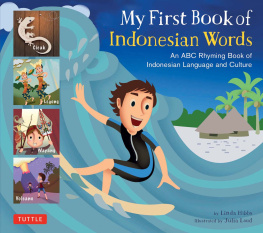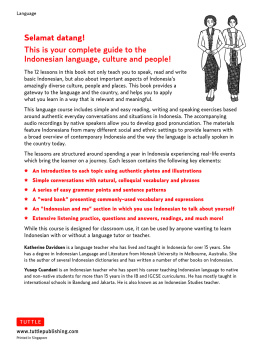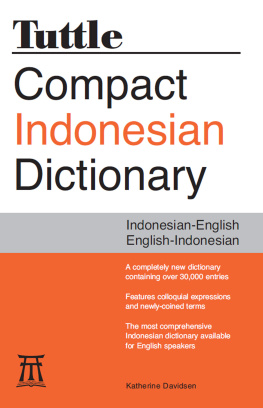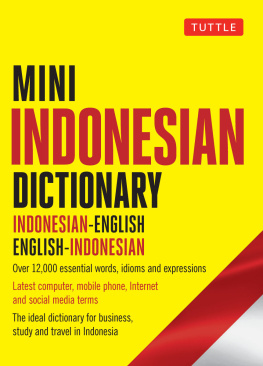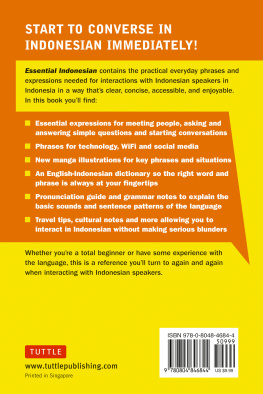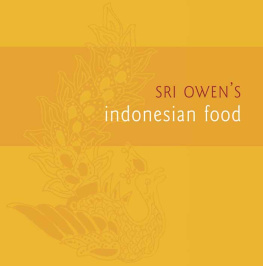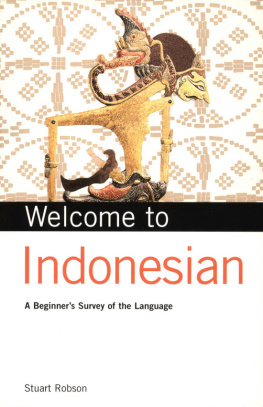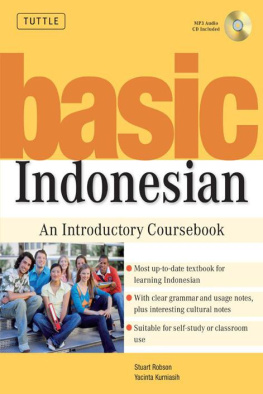Basic grammar
Indonesian is written in the roman alphabet and is not tonal. Its grammar is relatively simple in everyday conversation, but more complicated in formal or written style.
1 Verbs
The verb "to be" is generally not translated. Thus, the English sentence "I am sick" is translated just as saya sakit (I sick). Verbs also have no tense: "will go", "going", "went", "gone" are all translated as pergi. To indicate time, a few key adverbs are used such as kemarin ("yesterday"), sudah ("already"), nanti ("later"), akan/mau ("will") and belum ("not yet")flexibly indicating what has happened or will happen. For instance, "I was sick yesterday" saya sakit kemarin; "I am going to be sick" saya mau sakit.
Derived forms of verbs are often made of root words plus prefixes and/or suffixes such as mem-, ber-, -kan, -i, etc, particularly in more formal/written Indonesian. For instance, the word "to take" in Indonesian is membawa (made of the root word bawa + the prefix mem-). However, for daily conversations, using only the root word is acceptable. Therefore, you could use the word bawa instead of membawa to translate "to take".
To make the passive form of a verb, the prefix di- or ter- is normally added, and the agent is often expressed with oleh "by". For instance, "to be taken" dibawa (taken intentionally) or terbawa (taken unintentionally).
Some useful verbs:
To be, have, exist | ada |
To have, to own | punya (mempunyai) |
To need | perlu (memerlukan) |
To reach, get, attain | dapat (mendapat, mendapatkan) |
To like | suka (menyukai) |
To become, happen | jadi, menjadi, terjadi |
To know | tahu |
2 Nouns
A noun is sometimes made of a root word plus a prefix or suffix such as me-, pe-, -an. For example:
layan, root word | to serve |
pelayan (prefix pe-) | person who serves (waiter, porter, etc.) |
pelayanan (prefix pe-, suffix -an) | service |
melayani (prefix me-, suffix -i) | to serve (somebody) |
Nouns remain the same for numberthere is no singular or plural. Multiples are sometimes indicated by repeating the noun. For instance:
"car" | mobil |
"cars" | mobil-mobil |
The addition of -nya to the end of a word gives a sense of specific-ness. For example:
"car" mobil
"the car"/"his car"/"her car"/"their car" mobilnya
The articles "a", "an" and "the" are not expressed. For instance, "trip", "a trip", "the trip" are all translated as perjalanan.
3 Adjectives
As in French, adjectives in Indonesian come after the noun. For example, "waiting room" kamar tunggu (lit: room waiting); "red car" mobil merah (lit: car red).
To form the degrees of comparison (-er, -est), the words lebih ("more"), or paling ("most") are used before the adjective. For example:
"beautiful" | indah |
"more beautiful" | lebih indah |
"most beautiful" | paling indah |
"the nearest hospital" | rumah sakit paling dekat (lit: hospital-most-near) |
4 Personal pronouns |
I (formal) | saya |
I (informal) | aku |
You (formal) | Anda/Saudara |
You (informal) | kamu |
He, she, it | dia |
We (not including the listener) | kami |
We (including the listener) | kita |
You (plural) | kalian, saudara-saudara, saudara sekalian |
They | mereka |
Notes:
When addressing foreigners, Indonesian sometimes use Tuan ("Mr"), Nyonya ("Mrs") and Nona ("Miss") forms.
Indonesian people generally address all men as Bapak ("Mr") and women as Ibu ("Mrs"/"Miss").
The most common polite form for "you" in any situation is Anda. When addressing close friends or social inferiors kamu is used. Kamu can also be replaced with the person's name or just omitted.
"He", "she" and "it" are all dia, with no gender differentiation.
"It" is often not directly translated; it is sometimes omitted, sometimes expressed as "this" or "that".
Possession is indicated by placing the personal pronoun after the noun.
My ... (formal) | ... saya |
My ... (informal) | ... aku/... ku |
Your ... (formal) | ... Anda/... Saudara |
Your ... (informal) | ... kamu/... mu |
Her/his ... | ... -nya,...dia |
Their ... | ... mereka |
Refer to the following examples:
"food" | makanan |
"my food" | makanan saya or makananku |
"your food" | makanan Anda, makanan Saudara, makananmu |
"her/his food" | makanannya, makanan dia |
"their food" | makanan mereka |
5 Sentence construction
Sentences tend to be short and the most important word is often placed first. The order of a basic sentence is usually subject-verb-object. The subject within a sentence is often implied and not mentioned; this construction is used in most of the phrases in this book.
For example: Dia datang dengan saya? "He came with me?" = Mau datang? (lit: want-go?)
Question sentences:
There are three ways of constructing questions in Indonesian:
Use apa at the beginning of the sentence |
Use a question word (not necessarily first), such as di mana ("where") mengapa/kenapa ("why"), bagaimana ("how"), berapa ("how much"/"how many") and so on. |
Raise the inflection of the voice (omitting the word apa or question word at the beginning of the sentence) |
When seeking to confirm something, the word bukan/kan ("not") or ya ("yes") is simply added at the end of the sentence. For example, "interesting" menarik; "it's interesting, isn't it?" menarik bukan?/menarik kan?/menarik ya?
Notes:
Rather than using inflections which are considered a less formal way of asking questions, for your basic communication this book uses question words such as apa, berapa, siapa as much as possible.
If you construct a sentence incorrectly when you speak in Indonesian, people will still understand as long as you have a verb or important words in your sentence. For instance:
English | Which counter should I go to change money? |
Indonesian | Loket yang mana untuk tukar uang? |
Indonesian | Loket mana tukar uang? |
(lit: counter-which-change-money?) |



